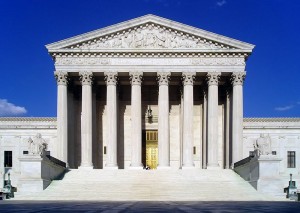 Yesterday, in a split 2-1 decision, a divided panel of the Sixth Circuit Court of Appeals upheld the constitutionality of Obamacare in the case of Thomas More Law Center v. Barack Hussein Obama, the first case to challenge the Patient Protection and Affordable Care Act.
Yesterday, in a split 2-1 decision, a divided panel of the Sixth Circuit Court of Appeals upheld the constitutionality of Obamacare in the case of Thomas More Law Center v. Barack Hussein Obama, the first case to challenge the Patient Protection and Affordable Care Act.
The Thomas More Law Center will ask the U.S. Supreme Court to review the case.
This is the first case on Obamacare decided by a federal appellate court. Judge Boyce Martin, a Carter appointee and Judge Jeffrey Sutton, a George W. Bush appointee, upheld the individual mandate of the Act under Congress’ Commerce Clause power. Judge James Graham, a Reagan appointee, dissented.
BUT THIS CASE IS MORE THAN JUST ABOUT HEALTH CARE.
If this decision is allowed to stand, we will no longer have a limited federal government of enumerated powers or even a representative form of government—we will have Congressional tyranny. Most members of Congress who voted on the Act had not even read the 2000 page bill and some didn’t care whether it was constitutional. Nancy Pelosi, then Speaker of the House, stated that Congress had to pass the bill so that the people could find out what’s in it.
We are heartened by the strongly worded dissent of Judge James Graham, the Reagan appointee. He echoed the Law Center’s primary concern and the reason we filed this lawsuit in the first instance. Here are some quotes from Judge Graham’s dissent:
- “If the exercise of power is allowed and the mandate upheld, it is difficult to see what the limits on Congress’s Commerce Clause authority would be. What aspect of human activity would escape federal power? . . . To approve the exercise of power would arm Congress with the authority to force individuals to do whatever it sees fit. . . .”
- “To the fatalistic view that Congress will always prevail and courts should step back and let the people, if offended, speak through their political representatives, I say that ‘courts were designed to be an intermediate body between the people and the legislature, in order, among other things, to keep the latter within the limits assigned to their authority.’ . . . In this arena, the ‘public force’ is entrusted to the courts.”
- “I believe the [Supreme] Court remains committed to the path laid down by Chief Justice Rehnquist and Justices O’Connor, Scalia, Kennedy, and Thomas to establish a framework of meaningful limitations on congressional power under the Commerce Clause. The current case is an opportunity to prove it so.”
Even Judge Sutton acknowledged that this is a case that the Supreme Court would likely review, noting that “we at the court of appeals are not just fallible but utterly non-final in this case.” He also noted that the Supreme Court should “either stop saying that a meaningful limit on Congress’s commerce powers exists or prove that it is so.”
Click here to read entire Court of Appeals opinion.
If you are concerned as I am about the unresponsiveness of our federal government to the people’s wishes on health care, please consider making a donation to TMLC and our appeal of Obamacare.
Richard Thompson, President & Chief Counsel
Thomas More Law Center




Pingback: Sixth Circuit's June 29 Decision Upholding the Health Care Statute is Generating Massive Commentary | 6th Circuit Appellate Blog()